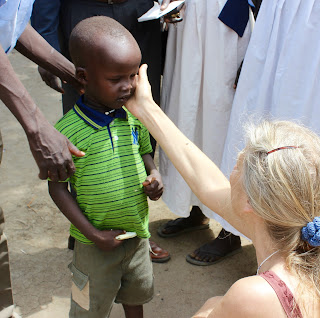Thoughts on Healing
Many years ago I had a discussion with African theological students. “Western medicine shows how you get malaria,” I was saying. “Yes,” one replied, “but it does not tell you who sent the mosquito!” Together we were exploring worldview and how it shapes our view of health and disease; how it shapes both what we do for healing and how we pray for it. It was fascinating to see how our cultural insights into these issues reflected biblical principles.
I have found there to be a depth of hunger to learn about and to put into practice the full scope of healing ministry – from community outreach through health teaching, to healing prayer for physical, inner and generational healing, deliverance and freedom from curses, to how to start a healing ministry in the local church. My sense is that teaching on healing has all too often been fragmentary, confusing, and in a way, passive. Healing prayer and health interventions have been perceived merely as things to be received rather than also to be given. There is a quality of joy when African saints are “equipped for ministry”, and it is a privilege to be a part of it.
Wendy
But St Matthew’s has become a home for other Anglicans as well. On Sunday afternoon a group of Nuer and Dinka Anglicans are worshiping together – a miracle given that Nuer and Dinka are killing each other in South Sudan. At the end of May this ‘Nilotic’ congregation will have its own confirmation service. Once a month a group of ‘Equatorians’ – South Sudanese from the southernmost part of the country – gather for fellowship. They use some English and some ‘Juba Arabic’ as there languages are many (Bari, More, Zande). And in a classroom in another part of the compound a small fellowship of Amharic believers is now meeting on Sunday mornings while the English congregation uses the church. Meanwhile, in another part of the city, Christ for All Nations Anglican Church, also known as the Saris Centre, is the home for a small Somali congregation.
+Grant
 |
| Good Samaritan icon – Egypt |
Update: Wendy’s Health
~ It’s not cancer!!!
~ “Slowly by slowly” the back is healing from fractures (5 vertebrae and 1 rib)! The full saying is, “Slowly by slowly the egg learns to walk” – an excellent saying and one that is applicable to most things African and otherwise!
~ Wendy has been diagnosed with multifocal bronchiectasis with bilateral pulmonary nodules. Medically, bronchiectasis is irreversible, but I am in the hands of the One who was wounded for my healing. Please pray for healing of the lungs, and protection from strain on the heart.
~ Apparently lots of calcium, vitamin D and good exercise wasn’t quite enough to keep my bones from developing severe osteoporosis. I’m dwelling in the words of Psalm 6:2, “Heal me, O Lord, for my bones are troubled”! There’s actually quite a lot about bones in the Psalms. Here’s my favourite: “..My soul will rejoice in the Lord, exulting in His salvation. All my bones shall say, “O Lord, who is like You…” Psalm 35:10
~ Please Pray with us ~
~ For a new Dean for St Frumentius’ Anglican Theological College ~ For our newest faculty member, Moses Hoth, a Nuer Gambellan now graduated with a Masters degree from the Ethiopian Graduate School of Theology in Addis.. ~ For safety and blessing on the new babies soon to be born in our Gambella Anglican Centre community; Bless the families of Chris and Suzy Wilson, and Josh and Jenny Smolders as they prepare for our newest and littlest members. ~ For peace in South Sudan. One thousand new refugees continue to arrive daily into the Gambella Region. Food is scarce in South Sudan due to the conflict having prevented the planting of crops for this rainy season. ~ For ministry opportunities opening in Somaliland, Djibouti, and the university towns of Ethiopia. ~ With thanksgiving for the plans and purposes that God has for us personally and for those we dearly love in Gambella as we walk through this season of decision and discernment regarding stewardship of health issues and future ministry. |

